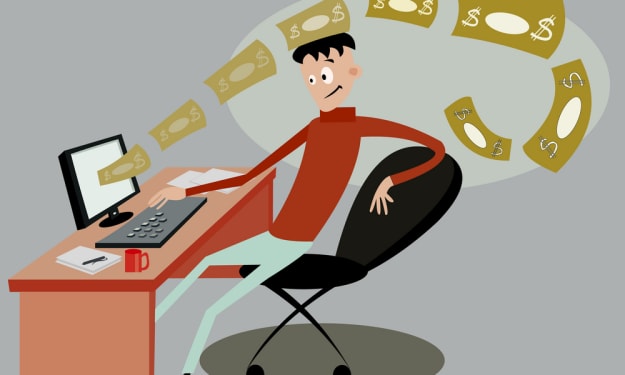The Ultimate Guide to Movies
Everything You Need to Know

Are you a movie buff looking for a comprehensive guide to your favorite pastime? Look no further! In this ultimate guide to movies, I will cover everything from the history of cinema to the latest blockbusters. So grab some popcorn and settle in for a deep dive into the world of film.
Introduction
Movies have been an integral part of our culture for over a century. From silent black and white films to the latest CGI-laden blockbusters, movies have the power to transport us to other worlds and tell stories that stay with us for a lifetime. Whether you're a casual moviegoer or a die-hard cinephile, there's always something new to discover in the world of film.
The History of Cinema: From Silent Films to Blockbusters
The history of cinema is a rich tapestry of technological advancements, artistic experimentation, and cultural influence. In this section, we'll take a look at some of the key moments in the evolution of film.
The Silent Era
The first movies were silent, black and white affairs, often accompanied by live music. These films relied heavily on visual storytelling, as there was no dialogue to convey the plot. Some of the most famous silent films include "The Birth of a Nation" and "City Lights."
The Golden Age of Hollywood
The 1930s and 40s were known as the Golden Age of Hollywood, a time when the studio system dominated the film industry. During this era, movies became more polished and sophisticated, with big-name stars like Cary Grant and Bette Davis becoming household names. Some of the most iconic films of this era include "Gone with the Wind" and "Casablanca."
The Rise of Independent Cinema
In the 1960s and 70s, a new wave of filmmakers emerged, eschewing the studio system in favor of smaller, independent productions. This led to the rise of the auteur, a director who had complete creative control over their films. Some of the most influential films from this era include "Easy Rider" and "The Godfather."
The Blockbuster Era
In the 1970s and 80s, the blockbuster era began, with films like "Jaws" and "Star Wars" breaking box office records and ushering in a new era of big-budget filmmaking. Today, blockbuster films dominate the box office, with superhero movies and franchises like the Marvel Cinematic Universe drawing huge crowds.
The Elements of a Good Movie: Storytelling, Cinematography, and More
What makes a good movie? While everyone's tastes are different, there are certain elements that are essential to a great film. In this section, we'll explore some of the key elements of a good movie.
Storytelling
At its core, a good movie tells a compelling story. Whether it's a simple romance or an epic adventure, the story is what draws us in and keeps us engaged. A great movie has well-developed characters, a clear plot, and a satisfying resolution.
Cinematography
Cinematography is the art of capturing the visual elements of a movie, including lighting, camera angles, and composition. A great cinematographer can use these tools to create mood, build tension, and tell the story in a visually stunning way.
Sound Design
Sound design is another important element of a great movie. A skilled sound designer can use music, sound effects, and dialogue to create a rich audio landscape that enhances the storytelling and immerses the viewer in the world of the film.
Editing
The editing process is where the raw footage of a movie is shaped into a cohesive whole. A good editor knows how to pace the film, create tension, and ensure that the story flows smoothly. They can also use editing techniques to create visual metaphors and enhance the emotional impact of the film.
Acting
Of course, a good movie also needs good acting. A skilled actor can bring a character to life, making them feel real and relatable to the audience. Whether it's a subtle, nuanced performance or a larger-than-life portrayal, great acting can make or break a movie.
Genres of Movies: From Romance to Horror
Movies come in all shapes and sizes, and there's a genre to suit every taste. In this section, we'll explore some of the most popular genres of movies.
Romance
Romance movies are all about love and relationships. Whether it's a sweeping epic like "Gone with the Wind" or a sweet, quirky indie romance like "500 Days of Summer," these movies are all about the heart.
Action
Action movies are all about excitement and thrills. From car chases to explosions, these movies are designed to get your heart racing. Popular action franchises include "Die Hard" and "Mission: Impossible."
Comedy
Comedy movies are all about making you laugh. From silly slapstick comedies to witty satires, these movies are perfect for a night of lighthearted entertainment. Popular comedy franchises include "The Hangover" and "Bridesmaids."
Horror
Horror movies are all about scaring you. From classic slasher films like "Halloween" to more psychological thrillers like "Get Out," these movies are designed to keep you on the edge of your seat.
Drama
Drama movies are all about human emotion and relationships. From family dramas to sweeping epics, these movies are all about exploring the complexities of the human experience. Popular drama franchises include "The Godfather" and "The Shawshank Redemption."
The Future of Movies: Streaming, Virtual Reality, and More
The world of movies is constantly evolving, with new technologies and platforms emerging all the time. In this section, we'll take a look at some of the trends that are shaping the future of movies.
Streaming
Streaming services like Netflix and Amazon Prime have revolutionized the way we watch movies. Instead of having to go to the theater or buy a DVD, we can now watch a huge variety of movies from the comfort of our own homes.
Virtual Reality
Virtual reality technology is still in its infancy, but it has the potential to completely change the way we experience movies. Imagine being able to step inside your favorite movie and interact with the characters and environments in a completely immersive way.
Artificial Intelligence
Artificial intelligence is already being used in the movie industry to help with everything from script analysis to marketing. As AI technology continues to advance, we may see even more innovative uses for it in the world of movies.
Thanks for the read, If you enjoyed it then be sure to check more of my work and always have a great day.
About the Creator
Arhum Nasir
A writer who specializes in creating captivating blogs, powerful poems, and informative articles
With a unique voice and a flair for storytelling.






Comments
There are no comments for this story
Be the first to respond and start the conversation.